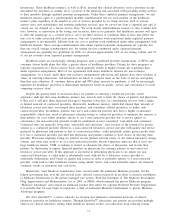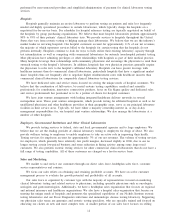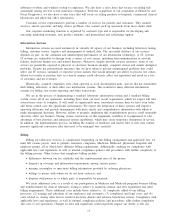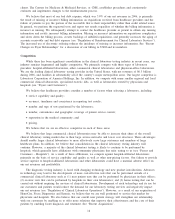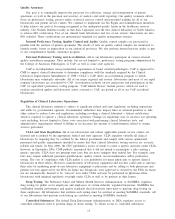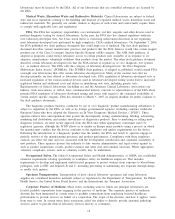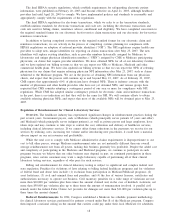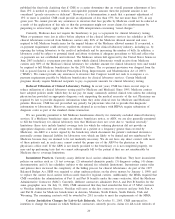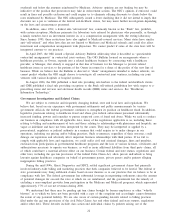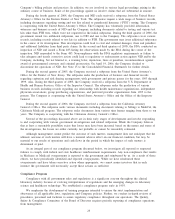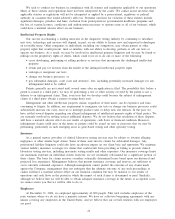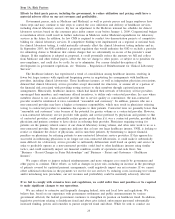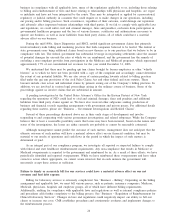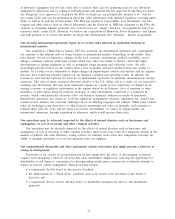Quest Diagnostics 2006 Annual Report Download - page 42
Download and view the complete annual report
Please find page 42 of the 2006 Quest Diagnostics annual report below. You can navigate through the pages in the report by either clicking on the pages listed below, or by using the keyword search tool below to find specific information within the annual report.clinical laboratory tests. While laboratories are, under certain criteria, permitted to directly bill Medicare for
clinical laboratory tests they refer to other laboratories, they must be reimbursed at the correct fee schedule
amount based on the Medicare fee schedule in effect in the Medicare carrier region in which the test was
actually performed. Historically, laboratories needed to enroll with and file claims to multiple carriers in order to
bill for such out-of-area test referrals, to ensure receipt of the appropriate payment amount. This has proven to be
an administratively difficult process, with many obstacles to obtaining accurate claims payment, including
applying the correct fee schedule. On July 1, 2004, CMS implemented a change mandating that the laboratory’s
“home” carrier maintain and apply the clinical laboratory fee schedule applicable to the carrier region where the
referred test was performed. This streamlined process allows a laboratory to file all of its clinical laboratory
claims to its “home” carrier.
CMS also has announced a parallel change with regard to purchased diagnostic interpretations (pathology
services). A previously announced change in Medicare carrier jurisdiction rules required laboratories to bill the
carrier where a purchased diagnostic interpretation service was performed. This would have required multiple
carriers to issue Medicare provider numbers to a laboratory billing for purchased diagnostic interpretation services
performed by others. In October 2004, CMS posted a “change notice” permitting laboratories to temporarily bill
their local carriers for purchased diagnostic tests or interpretations regardless of the location where the
interpretive service was furnished. The final change notice was issued on October 29, 2004, effective April 1,
2005. The final notice requires carriers to implement a new edit to check for duplicate claims for referred clinical
diagnostic laboratory and purchased diagnostic services submitted by physicians/suppliers to more than one
carrier.
Competitive Bidding. The MMA requires CMS to conduct two demonstration projects of competitive
bidding for clinical laboratory tests. CMS awarded the clinical laboratory competitive bidding demonstration
design and implementation contract to RTI International, Research Triangle Park, North Carolina, and its
subcontractor, Palmetto GBA. Palmetto is a Part B carrier and previously conducted for CMS a competitive
bidding demonstration for Durable Medical Equipment (DME). In August 2005, RTI presented its draft design at
a public meeting. The RTI proposal incorporated several ACLA recommendations, including having bidders bid
on the full range of tests paid under the laboratory fee schedule, utilizing a fee-for-service basis for bidding, and
allowing bidders to subcontract. CMS was required to submit its initial report on the competitive bidding
proposal by December 31, 2005. In April 2006, CMS issued a brief status report endorsing the RTI draft design.
CMS is holding to its plans to announce the competitive bidding demonstration areas and begin accepting bids
from clinical laboratories by the second quarter of 2007. However, the Office of Management and Budget
(OMB), which has approved the bidding form, has not yet approved CMS’s design for the competitive bidding
program or the two sites for the pilots. Since a number of necessary steps must occur after OMB approval, at
this time it is uncertain when an actual demonstration could begin. In addition, because the laboratory industry is
concerned about the general lack of responsiveness by CMS to industry concerns about the bidding process, it is
discussing industry concerns with members of Congress and Committee staffs. In addition, the President’s 2008
budget proposes Medicare cost savings from competitive bidding for clinical laboratory services of $2.38 billion
over five years, including $110 million in 2008. This estimate appears to presume that CMS would implement
competitive bidding before completion of the Medicare competitive bidding demonstration. We believe that
clinical laboratory services are not commodities like DME and the quality of services and access to those
services could be adversely impacted by implementation of competitive bidding. If competitive bidding were
implemented on a regional or national basis for clinical laboratory testing, it could materially adversely affect the
clinical laboratory industry and us.
Future Legislation. Future changes in federal, state and local regulations (or in the interpretation of current
regulations) affecting governmental reimbursement for clinical laboratory testing could adversely affect us. We
cannot predict, however, whether and what type of legislative proposals will be enacted into law or what
regulations will be adopted by regulatory authorities.
Fraud and Abuse Regulations. Medicare and Medicaid anti-kickback laws prohibit clinical laboratories
from making payments or furnishing other benefits to influence the referral of tests billed to Medicare, Medicaid
or other federal programs. As noted above, the penalties for violation of these laws may include criminal and
civil fines and penalties and/or suspension or exclusion from participation in federal programs. Many of the anti-
fraud statutes and regulations, including those relating to joint ventures and alliances, are vague or indefinite and
have not been interpreted by the courts. We cannot predict if some of the fraud and abuse rules will be
interpreted contrary to our practices.
In November 1999, the OIG issued an advisory opinion concluding that the industry practice of discounting
client bills may constitute a kickback if the discounted price is below a laboratory’s overall cost (including
21


